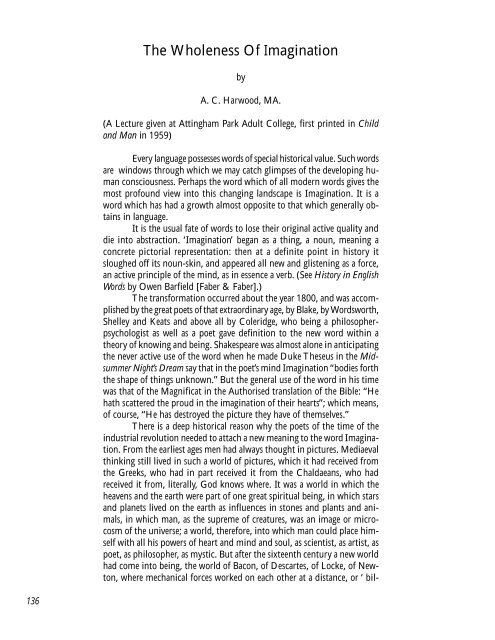Colloquium on English - Research Institute for Waldorf Education
Colloquium on English - Research Institute for Waldorf Education
Colloquium on English - Research Institute for Waldorf Education
You also want an ePaper? Increase the reach of your titles
YUMPU automatically turns print PDFs into web optimized ePapers that Google loves.
136<br />
The Wholeness Of Imaginati<strong>on</strong><br />
by<br />
A. C. Harwood, MA.<br />
(A Lecture given at Attingham Park Adult College, first printed in Child<br />
and Man in 1959)<br />
Every language possesses words of special historical value. Such words<br />
are windows through which we may catch glimpses of the developing human<br />
c<strong>on</strong>sciousness. Perhaps the word which of all modern words gives the<br />
most profound view into this changing landscape is Imaginati<strong>on</strong>. It is a<br />
word which has had a growth almost opposite to that which generally obtains<br />
in language.<br />
It is the usual fate of words to lose their original active quality and<br />
die into abstracti<strong>on</strong>. ‘Imaginati<strong>on</strong>’ began as a thing, a noun, meaning a<br />
c<strong>on</strong>crete pictorial representati<strong>on</strong>: then at a definite point in history it<br />
sloughed off its noun-skin, and appeared all new and glistening as a <strong>for</strong>ce,<br />
an active principle of the mind, as in essence a verb. (See History in <strong>English</strong><br />
Words by Owen Barfield [Faber & Faber].)<br />
The trans<strong>for</strong>mati<strong>on</strong> occurred about the year 1800, and was accomplished<br />
by the great poets of that extraordinary age, by Blake, by Wordsworth,<br />
Shelley and Keats and above all by Coleridge, who being a philosopherpsychologist<br />
as well as a poet gave definiti<strong>on</strong> to the new word within a<br />
theory of knowing and being. Shakespeare was almost al<strong>on</strong>e in anticipating<br />
the never active use of the word when he made Duke Theseus in the Midsummer<br />
Night’s Dream say that in the poet’s mind Imaginati<strong>on</strong> “bodies <strong>for</strong>th<br />
the shape of things unknown.” But the general use of the word in his time<br />
was that of the Magnificat in the Authorised translati<strong>on</strong> of the Bible: “He<br />
hath scattered the proud in the imaginati<strong>on</strong> of their hearts”; which means,<br />
of course, “He has destroyed the picture they have of themselves.”<br />
There is a deep historical reas<strong>on</strong> why the poets of the time of the<br />
industrial revoluti<strong>on</strong> needed to attach a new meaning to the word Imaginati<strong>on</strong>.<br />
From the earliest ages men had always thought in pictures. Mediaeval<br />
thinking still lived in such a world of pictures, which it had received from<br />
the Greeks, who had in part received it from the Chaldaeans, who had<br />
received it from, literally, God knows where. It was a world in which the<br />
heavens and the earth were part of <strong>on</strong>e great spiritual being, in which stars<br />
and planets lived <strong>on</strong> the earth as influences in st<strong>on</strong>es and plants and animals,<br />
in which man, as the supreme of creatures, was an image or microcosm<br />
of the universe; a world, there<strong>for</strong>e, into which man could place himself<br />
with all his powers of heart and mind and soul, as scientist, as artist, as<br />
poet, as philosopher, as mystic. But after the sixteenth century a new world<br />
had come into being, the world of Bac<strong>on</strong>, of Descartes, of Locke, of Newt<strong>on</strong>,<br />
where mechanical <strong>for</strong>ces worked <strong>on</strong> each other at a distance, or ‘ bil-

















